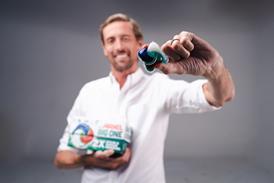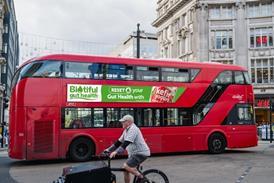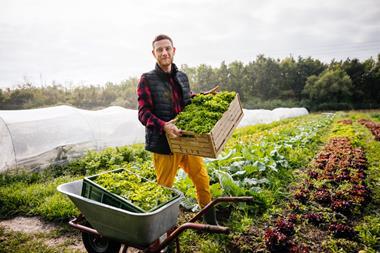The nation that created the deep-fried Mars bar is changing its unhealthy ways thanks to government support and some pioneering retailers. Karen Peattie investigates
With smoking in public places now outlawed and a dedicated government campaign to encourage people to eat a balanced diet, drink less alcohol and exercise more often, Scotland's reputation as an unhealthy nation is well on the way to becoming a thing of the past.
Last month the Scottish Executive launched the new "Don't Push It" campaign, which asks Scots to think first before they encourage others to have "just another drink". Supported by a new website and telephone helpline service, the campaign aims to challenge Scotland's attitude to alcohol. But it has already met with controversy, with some publicans claiming that it is the first step towards banning the purchase of "rounds" in pubs.
There is no such controversy surrounding the high-profile Healthy Living Neighbourhood Shop Initiative, however. It was launched two-and-a-half years ago with the support of the Executive, and approval for "substantial" funding of Phase 3 of the campaign has recently been granted. A full-time development manager, Roy Williams, has also been appointed to sign up more convenience stores.
This upweighted activity coincides with a change in name for the project. It's now called the SGF Healthy Living Programme and operates under the umbrella of the Scottish Grocers' Federation. The SGF's Support Training company has also assisted the programme's co-ordinator, Ross Kerr, to put together a training manual and CD-Rom.
Says Kerr: "Our challenge now is to get more retailers and suppliers involved and the appointment of a development manager will enable us to target retailers and sit down with them to explain what they can achieve by participating."
Williams is a well-known figure in the Scottish convenience marketplace, having worked for many years in the drinks industry, latterly with InBev. "Roy has already started speaking to retailers and I expect significant numbers to come on board over the coming months," says Kerr.
"We're really pleased with the new training manual and CD, which will help retailers identify opportunities for developing their fresh produce offer and, at the same time, encourage their customers to improve their diet."
It was Robert Wiseman Dairies that originally mooted the ground-breaking programme. Called the Wise Food Project in those early days and led by Wiseman's sales and marketing director Sandy Wilkie, the aim was to bring together a group of leading c-store operators for informal discussions to gauge interest and the scope for development.
Botterills Convenience Stores, CJ Lang, David Sands, Eddie Thompson's Morning Noon & Night (now Scotmid) and the former Aberness business, prior to its acquisition by Somerfield, were all enthusiastic supporters of Wiseman's initiative to highlight the need for c-store chains and independents to do their bit to help promote healthier eating habits and, at the same time, sell more fresh produce in their own stores.
The Executive's food and health co-ordinator, Gillian Kynoch, then joined in the discussions and realised that c-stores had the potential to play a key role in spreading the healthy eating message, particularly in neighbourhoods with low levels of car ownership and limited public transport facilities.
Ross Kerr, who had recently retired as head of PepsiCo (then Walkers Snacks) in Scotland, was invited to co-ordinate the project and, working closely with Kynoch, embarked on research, talking to retailers about their fresh food offering, discussing merchandising and considering new ways of focusing on healthier food options in stores.
The official launch of the Healthy Living Neighbourhood Shop Initiative took place at the SGF conference at St Andrews in 2004 with the five original supporters - having about 180 stores between them at the time - throwing their considerable weight behind it.
From April to October that year, a six-month pilot study - the first phase of the initiative - set out to evaluate the potential of the convenience store sector to successfully and profitably promote the Executive's Healthy Living brand and healthier food choices, with a view to helping inform and educate.
The total cost of Phase 1 was £20,000, of which 50% was contributed by the Executive and the other 50% provided by the participating retailers. All of these stores acknowledged that the growing demand for a healthier lifestyle among the Scottish population - and their customers - presented considerable scope to develop this area of their businesses.
Phase 1 saw retailers experiment with healthy meal deals and incentives such as offering a free piece of fruit with non-sugar drinks; price promoting fruit and vegetables; siting healthy eating options near checkout areas; displaying fruit at checkouts instead of snacks or confectionery; and giving a free piece of fruit to customers spending £2 or more.
Some adopted their local secondary school and distributed leaflets advising pupils of healthier lunch options available, again including a free piece of fruit. And for every child accompanying a parent on a shopping trip, there was also free fruit.
Phase 2 of the initiative kicked off in March 2005, with the results of that activity exceeding expectations.
The Executive committed £500,000 to help local stores promote healthy food choices using the original principles of the initiative and based on the findings of the six-month pilot study, which included:
- A 14.6% increase in total soft drink sales and a 21% increase in cash profit achieved by increasing the range of fruit drinks and reducing the range of carbonates in-store
- A promotion featuring a range of healthy ready meals resulted in a 260% increase in sales
- Moving fruit and vegetables from the rear of the store to the front contributed to a 36% sales uplift in the first week and has produced ongoing increases of 62%
- In another store, a 400% increase in sales of fruit and veg was achieved by increasing the space for the category and moving it to the front of the store
- More fruit than confectionery was sold by positioning it at checkouts.
With fresh produce offering convenience retailers the potential to account for 2% of total turnover within an average store and in bigger stores, by as much as 8%, the profit opportunity should need little explanation. However, as Kerr points out, no retailer is going to exploit that profit potential without stocking the right range.
"Variety is important because your customers want to try different products as well as the core lines such as bananas, apples, potatoes and carrots. Then you have to make sure that fruit and veg is visible and supported by good pos and also consider secondary displays."
Stephen Brown, operations director at Kinross-based David Sands, agrees that a wide range is vital. He says: "Listing the core range is key but also important is the introduction of new varieties to create consumer interest and to address the growing demand for pre-packed fruit pots and salad bowls."
SGF president Pete Cheema, who was one of the first retailers to take delivery of new Healthy Living-branded impulse display units for fruit and veg, has focused heavily on promotions and pricing. "By running weekend promotions, I can increase my fruit sales tenfold," he says.
A number of retailers now have campaign-branded chillers in their stores and this equipment, like the new impulse units, features the eye-catching healthyliving apple logo. Point of sale material is free and chillers are subsidised to the tune of 50%.
Kerr explains: "If a retailer is provided with an impulse display unit, it must be used properly and for its intended purpose. What we also want to see is participating stores appoint a 'fresh champion' who then takes responsibility for fresh produce."
Any retailer seeking further information on the SGF Healthy Living Programme should contact the SGF on 0131 343 3300. For more about the Executive's campaign, visit www.healthyliving.gov.uk.
With smoking in public places now outlawed and a dedicated government campaign to encourage people to eat a balanced diet, drink less alcohol and exercise more often, Scotland's reputation as an unhealthy nation is well on the way to becoming a thing of the past.
Last month the Scottish Executive launched the new "Don't Push It" campaign, which asks Scots to think first before they encourage others to have "just another drink". Supported by a new website and telephone helpline service, the campaign aims to challenge Scotland's attitude to alcohol. But it has already met with controversy, with some publicans claiming that it is the first step towards banning the purchase of "rounds" in pubs.
There is no such controversy surrounding the high-profile Healthy Living Neighbourhood Shop Initiative, however. It was launched two-and-a-half years ago with the support of the Executive, and approval for "substantial" funding of Phase 3 of the campaign has recently been granted. A full-time development manager, Roy Williams, has also been appointed to sign up more convenience stores.
This upweighted activity coincides with a change in name for the project. It's now called the SGF Healthy Living Programme and operates under the umbrella of the Scottish Grocers' Federation. The SGF's Support Training company has also assisted the programme's co-ordinator, Ross Kerr, to put together a training manual and CD-Rom.
Says Kerr: "Our challenge now is to get more retailers and suppliers involved and the appointment of a development manager will enable us to target retailers and sit down with them to explain what they can achieve by participating."
Williams is a well-known figure in the Scottish convenience marketplace, having worked for many years in the drinks industry, latterly with InBev. "Roy has already started speaking to retailers and I expect significant numbers to come on board over the coming months," says Kerr.
"We're really pleased with the new training manual and CD, which will help retailers identify opportunities for developing their fresh produce offer and, at the same time, encourage their customers to improve their diet."
It was Robert Wiseman Dairies that originally mooted the ground-breaking programme. Called the Wise Food Project in those early days and led by Wiseman's sales and marketing director Sandy Wilkie, the aim was to bring together a group of leading c-store operators for informal discussions to gauge interest and the scope for development.
Botterills Convenience Stores, CJ Lang, David Sands, Eddie Thompson's Morning Noon & Night (now Scotmid) and the former Aberness business, prior to its acquisition by Somerfield, were all enthusiastic supporters of Wiseman's initiative to highlight the need for c-store chains and independents to do their bit to help promote healthier eating habits and, at the same time, sell more fresh produce in their own stores.
The Executive's food and health co-ordinator, Gillian Kynoch, then joined in the discussions and realised that c-stores had the potential to play a key role in spreading the healthy eating message, particularly in neighbourhoods with low levels of car ownership and limited public transport facilities.
Ross Kerr, who had recently retired as head of PepsiCo (then Walkers Snacks) in Scotland, was invited to co-ordinate the project and, working closely with Kynoch, embarked on research, talking to retailers about their fresh food offering, discussing merchandising and considering new ways of focusing on healthier food options in stores.
The official launch of the Healthy Living Neighbourhood Shop Initiative took place at the SGF conference at St Andrews in 2004 with the five original supporters - having about 180 stores between them at the time - throwing their considerable weight behind it.
From April to October that year, a six-month pilot study - the first phase of the initiative - set out to evaluate the potential of the convenience store sector to successfully and profitably promote the Executive's Healthy Living brand and healthier food choices, with a view to helping inform and educate.
The total cost of Phase 1 was £20,000, of which 50% was contributed by the Executive and the other 50% provided by the participating retailers. All of these stores acknowledged that the growing demand for a healthier lifestyle among the Scottish population - and their customers - presented considerable scope to develop this area of their businesses.
Phase 1 saw retailers experiment with healthy meal deals and incentives such as offering a free piece of fruit with non-sugar drinks; price promoting fruit and vegetables; siting healthy eating options near checkout areas; displaying fruit at checkouts instead of snacks or confectionery; and giving a free piece of fruit to customers spending £2 or more.
Some adopted their local secondary school and distributed leaflets advising pupils of healthier lunch options available, again including a free piece of fruit. And for every child accompanying a parent on a shopping trip, there was also free fruit.
Phase 2 of the initiative kicked off in March 2005, with the results of that activity exceeding expectations.
The Executive committed £500,000 to help local stores promote healthy food choices using the original principles of the initiative and based on the findings of the six-month pilot study, which included:
- A 14.6% increase in total soft drink sales and a 21% increase in cash profit achieved by increasing the range of fruit drinks and reducing the range of carbonates in-store
- A promotion featuring a range of healthy ready meals resulted in a 260% increase in sales
- Moving fruit and vegetables from the rear of the store to the front contributed to a 36% sales uplift in the first week and has produced ongoing increases of 62%
- In another store, a 400% increase in sales of fruit and veg was achieved by increasing the space for the category and moving it to the front of the store
- More fruit than confectionery was sold by positioning it at checkouts.
Increased sales
Since then HIM has conducted extensive research revealing sharp increases not only in the sale of fruit and vegetables in participating stores, but also in products such as fresh milk, chilled juice, yogurt, healthier spreads and bottled water. The company's consumer research further reveals that 45% of shoppers are buying more fresh produce now compared with 12 months ago, with half of all shoppers surveyed claiming they would use their local c-store more often if the range of healthy produce was improved.With fresh produce offering convenience retailers the potential to account for 2% of total turnover within an average store and in bigger stores, by as much as 8%, the profit opportunity should need little explanation. However, as Kerr points out, no retailer is going to exploit that profit potential without stocking the right range.
"Variety is important because your customers want to try different products as well as the core lines such as bananas, apples, potatoes and carrots. Then you have to make sure that fruit and veg is visible and supported by good pos and also consider secondary displays."
Stephen Brown, operations director at Kinross-based David Sands, agrees that a wide range is vital. He says: "Listing the core range is key but also important is the introduction of new varieties to create consumer interest and to address the growing demand for pre-packed fruit pots and salad bowls."
SGF president Pete Cheema, who was one of the first retailers to take delivery of new Healthy Living-branded impulse display units for fruit and veg, has focused heavily on promotions and pricing. "By running weekend promotions, I can increase my fruit sales tenfold," he says.
A number of retailers now have campaign-branded chillers in their stores and this equipment, like the new impulse units, features the eye-catching healthyliving apple logo. Point of sale material is free and chillers are subsidised to the tune of 50%.
Kerr explains: "If a retailer is provided with an impulse display unit, it must be used properly and for its intended purpose. What we also want to see is participating stores appoint a 'fresh champion' who then takes responsibility for fresh produce."
Any retailer seeking further information on the SGF Healthy Living Programme should contact the SGF on 0131 343 3300. For more about the Executive's campaign, visit www.healthyliving.gov.uk.


























No comments yet